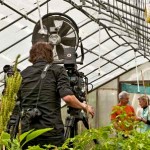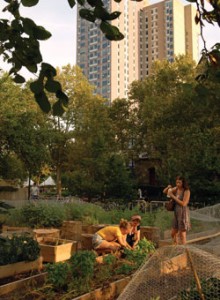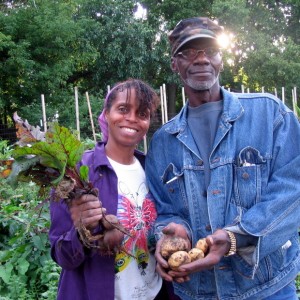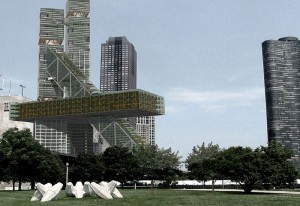Vertical Farming, Biopesticides & Drought
Resistant Seeds Take Center Stage at the Agriculture 2.0 Global Investments Conference
Agriculture 2.0 Canada Set for October 19
 NEW YORK, Sep 15, 2010 — NewSeed Advisors, an integrated investment banking and advisory practice for sustainable agriculture ventures, hosted the third edition of the Agriculture 2.0(TM) investment conference in New York City yesterday. 150 industry leaders, including Ernesto Brovelli, Senior Manager of Sustainability for The Coca-Cola Company and Don Borgman, Director of Agriculture Industry Relations for John Deere, gathered at Agriculture 2.0 Global Investments and met with entrepreneurs presenting groundbreaking technologies such as drip irrigation, organic crop protection and drought-resistant seeds. Participants from RockPort Capital Partners, General Atlantic, DuPont Agricultural Biotechnology, Rabobank, UBS and many more came together to learn the nuances of investing in the rapidly-changing, multi-trillion dollar market of sustainable agriculture.
NEW YORK, Sep 15, 2010 — NewSeed Advisors, an integrated investment banking and advisory practice for sustainable agriculture ventures, hosted the third edition of the Agriculture 2.0(TM) investment conference in New York City yesterday. 150 industry leaders, including Ernesto Brovelli, Senior Manager of Sustainability for The Coca-Cola Company and Don Borgman, Director of Agriculture Industry Relations for John Deere, gathered at Agriculture 2.0 Global Investments and met with entrepreneurs presenting groundbreaking technologies such as drip irrigation, organic crop protection and drought-resistant seeds. Participants from RockPort Capital Partners, General Atlantic, DuPont Agricultural Biotechnology, Rabobank, UBS and many more came together to learn the nuances of investing in the rapidly-changing, multi-trillion dollar market of sustainable agriculture.
“This is a great conference,” said Ric Fulop, Partner with North Bridge Capital, “NewSeed is definitely the leader in this space.” Highlights included a presentation by Dickson Despommier of Columbia University about the global possibilities for vertical farming in urban centers. Mike Dwyer, Director of Foreign Trade for the USDA discussed the forecast for investors over the next 10 years as commodity prices continue to soar. Anna Lappe, renowned author and founding principal of the Small Planet Institute, closed the day with a focused look at the challenges facing the global food system, and the role that investors and entrepreneurs will play in finding solutions.
On October 19, 2010, Agriculture 2.0 will be at the Hilton Toronto for the first-ever sustainable agriculture investment conference in Canada. This event will bring together hundreds of investors and industry professionals united by the common goal of capitalizing sustainable agriculture innovations in Canada and beyond. 16 jury-selected entrepreneurs will present proprietary investment opportunities to participants from the investment community. Jay Bradshaw, President of Syngenta Canada, is slated to address the conference along with Jean-Philippe Gervais, Senior Agricultural Economist for Farm Credit Canada.
Agriculture 2.0 Canada is presented by Bioenterprise Corporation, co-hosted by NewSeed Advisors and Avrio Ventures, and is additionally sponsored by Farm Credit Canada. Registration is available exclusively at www.agriculture20.com. SOURCE: NewSeed Advisors
Vertical Farm Concept is a Green Gateway for Chicago
The Chicago Gateway is composed of two vertical mixed-use towers supported by a leaning tower covered in a green roof. Offices and commercial space would reside in the vertical towers and residences in the leaning tower, which bridges over Lake Shore Drive. All of the structures are connected together via a vertical farm podium, and a network of sky bridges connects the towers and provides access to other nearby buildings. Urban farming via hydroponics would take place inside the green podium, and a green roof would grow additional produce. Vegetables and herbs would be grown in mechanized hanging baskets in the hydroponic farm. Produce from the farm could be delivered via they sky bridges, and the public can access the building and use the elevated routes to travel around the city.
This design, which was created in 2007, was a finalist for the prestigious Schiff Foundation Fellowship. Inhabitat – Green Design Will Save the World
Greensgrow Farms – from brownfield to model commercial urban farm
 Linked by Michael Levenston-Must-see interview with Mary Seton Corboy of Greensgrow Farms
Linked by Michael Levenston-Must-see interview with Mary Seton Corboy of Greensgrow Farms
By Growing a Greener World, a groundbreaking new television series that delivers the latest trends in eco-friendly living mixed with traditional gardening know-how to a modern audience.
Joe and Patti journey to Philadelphia, home of Greensgrow Farms, fulfillment of the dream of visionary in urban farming, Mary Seton Corboy. More than ten years ago a city block in the Kensington area was the site of an abandoned galvanized steel plant and an EPA brownfields project (see below) that the neighborhood had given up on. But not Mary. Beginning the experimental transformation she was growing lettuce hydroponically (growing plants in a water and nutrient solution without soil) for her clients; high-end local restaurants in need of fresh, organic produce. But the one attribute she prides herself on is her ability to change.
At the time there weren’t any urban farms to model themselves after, but today Greensgrow is a prime example of the urban farm concept, houses a retail nursery, hosts a weekly farmers market, CSA (Community Supported Agriculture) and a teaching community kitchen. They still deliver to restaurants however now they obtain used vegetable oil which is refined into bio-diesel fuel that powers their vehicles. Now, that is ‘walking their talk’ and as you will see there is much more. Mary considers Greensgrow to be the bridge between the constantly changing urban consumer and the rural producer. They help the farmer understand these changes and encourage them to grow that which customers are interested. She is quick to say that urban farming is not taking the place of the rural producer but rather is the vehicle for educating the consumer about its benefits.
Festival lauds urban farming
By Candace Hsu | Daily Lobo
By Candace Hsu | Daily Lobo-If you like Facebook farming, you’re going to love this. The third annual Open Space Urban Farm and Harvest Festival is taking place Saturday at the Open Space Visitor Center. Kent Swanson, the co-organizer for the event, said the event gives agricultural enthusiasts networking opportunities. “With this event, we want to bring attention and celebrate the land that the Open Space Division manages as agricultural properties,” he said. “With the growing movement to preserve local agriculture, it is a great time to make the public aware of the land that the city manages.”
He said that the Open Space Division manages 366 acres of local land. This land is used for growing and also acts as wildlife preserves. Local farmers and businesses will man booths at the event. The festival promotes urban farming, or farming that takes place in a metropolitan area, Swanson said. “I have a 5-year-old son. I take him to the local farms here,” he said. “I want the next generation to be conscious and aware of where their food comes from.” The festival will offer events for children this year as well as a seed exchange, allowing gardeners to share seeds with each other. “It is important for our community to buy local and support the agriculture that we have,” Swanson said. “What we have now is wonderful, and without support, we will lose more and more land.”
Swanson works alongside Kim Selving, a co-organizer who has been planning this event for six months. “It is rewarding to see how hard people work to farm and to create products for us to enjoy,” she said. “The enthusiasm really builds when we all get together.” Selving said many college students find it hard to stop and be healthy because they lack the resources. She said the event promotes learning about healthy and local products. “This event is personal to me because Albuquerque is unique in having farmland so close to where we live,” she said. “Having this event is crucial for the community because it will give people a range of options of where to buy food locally.” Published September 16, 2010 in Culture
Campus garden takes root on Locust Walk
 By Heather A. Davis-Photo credit: Peter Tobia-Urban gardens have become a familiar sight in Philadelphia—from the Mill Creek Farm to the west, the Schuylkill River Park Community Garden in Center City and Greensgrow Farms in Kensington. The University is now part of this growing urban farming landscape. The Penn Garden, founded and run by students, is a food-producing green oasis located at the foot of Rodin College House on Locust Walk. The garden began as an idea proposed by students taking the class, “Sustainability at Penn,” in the fall of 2009. It came into being with financial support from Penn’s Green Fund.
By Heather A. Davis-Photo credit: Peter Tobia-Urban gardens have become a familiar sight in Philadelphia—from the Mill Creek Farm to the west, the Schuylkill River Park Community Garden in Center City and Greensgrow Farms in Kensington. The University is now part of this growing urban farming landscape. The Penn Garden, founded and run by students, is a food-producing green oasis located at the foot of Rodin College House on Locust Walk. The garden began as an idea proposed by students taking the class, “Sustainability at Penn,” in the fall of 2009. It came into being with financial support from Penn’s Green Fund.
The idea behind the Penn Garden is for it to be a place where members of the University community can grow their own food and learn about issues of food production and agriculture. “It’s really important for people to know where their food comes from and if possible, to control where food comes from,” says Maura Goldstein, a College senior who is helping to oversee plantings and activities at the garden. “We’re facilitating that process.”
The garden has 10 beds of vegetables—eight beds that are 4’x12’ and two that are 8’x10’. Because of its small size, the garden is not designed to be a major source of food for the University. “We’re not necessarily changing the food landscape of campus,” explains Goldstein. “We’re making it possible for people to have a direct relationship with that food.”
Samantha Beattie, a College junior who was one of the students who worked on the original proposal for the garden, says she hopes the garden inspires people to consider the origin of their food. “A lot of people just don’t think about where food comes from, especially in a city,” she says. “[This] reminds people you can still grow your own food in a city.”
The garden is also an important social space where students can connect with each other and members of the wider community. “It’s been really fun to be at the garden this summer,” adds Goldstein. “We do hard work, and sometimes, we do weeding and harvesting.” The garden draws about six people on each designated workday, mainly students, but also people who live and work in the community. Growers get to keep their bounty, which this summer included different types of tomatoes, eggplant, fennel, mustard greens, bell peppers, jalapeños, onions and tomatillos. The crew just planted several fall and winter crops, including broccoli, kale, spinach and lettuce, and may plant some cauliflower. Goldstein says they plan to donate extra produce to the food pantry at St. Mary’s Church, which is located across Locust Walk from the garden, though so far, there haven’t been many veggies to spare. Since it is the garden’s first year, Beattie, Goldstein and others are learning by trial and error about the crops that are the most popular, and those that require some creativity with recipes, including jalapeños and mustard greens.
The vegetables are grown organically, without the use of any pesticides. Aside from a few beetles and tenacious early-season squirrels, Beattie says they’ve had good luck with the process.
The Penn Garden welcomes novice and experienced gardeners alike for help tending the 10 beds. On Sept. 19, the Garden will be a stop on West Philly Gardens Day, which allows the public to tour and learn about different community gardens across the neighborhood. The Penn Garden is also helping to host a Sept. 29 screening of the documentary, “Food Fight,” and a discussion with the film’s director Chris Taylor. The garden crew will also be participating in Penn’s annual Food Week, held Oct. 18 to 22.
Going forward, Beattie says they hope to attract more academic and community involvement with the garden, bringing speakers to campus and hosting harvest dinners at the site. “[The garden] is about more than just picking and harvesting,” says Beattie. “We really want to be a community space where students get together and learn about community agriculture and what it means.”
To learn more about the Penn Garden, visit its website at http://thepenngarden.wordpress.com.
Grand Central Bakery Wrangles Urban Rodeo Street Fest
Thursday, September 16, 2010, by Erin DeJesus
 Or, an exercise in how many rodeo/urban farming puns one blogger can rope into a post (whee!). This Saturday, the N Fremont branch of Seattle-based breadmakers Grand Central Bakery throws its first annual Bakery Fair, “an urban farming expo and bicycle rodeo” that brings old-school country fair activities (like baking and preserving contests, farming seminars, and produce judging) to the cafe’s Boise parking lot. The Grand Central staff will cook up a special BBQ menu in addition to hosting baking and cheese-making demos and seminars, while a talk by urban farming expert Novella Carpenter and a bicycling rodeo (complete with a costume contest for your wheels) round out the day. All proceeds will benefit Zenger Farm and the Community Cycling Center.
· Grand Central Bakery Fair [Official site]
Or, an exercise in how many rodeo/urban farming puns one blogger can rope into a post (whee!). This Saturday, the N Fremont branch of Seattle-based breadmakers Grand Central Bakery throws its first annual Bakery Fair, “an urban farming expo and bicycle rodeo” that brings old-school country fair activities (like baking and preserving contests, farming seminars, and produce judging) to the cafe’s Boise parking lot. The Grand Central staff will cook up a special BBQ menu in addition to hosting baking and cheese-making demos and seminars, while a talk by urban farming expert Novella Carpenter and a bicycling rodeo (complete with a costume contest for your wheels) round out the day. All proceeds will benefit Zenger Farm and the Community Cycling Center.
· Grand Central Bakery Fair [Official site]
Festival lauds urban farming
Published: 09/16 12:56am By: Candace Hsu – If you like Facebook farming, you’re going to love this.
The third annual Open Space Urban Farm and Harvest Festival is taking place Saturday at the Open Space Visitor Center.
Kent Swanson, the co-organizer for the event, said the event gives agricultural enthusiasts networking opportunities. “With this event, we want to bring attention and celebrate the land that the Open Space Division manages as agricultural properties,” he said. “With the growing movement to preserve local agriculture, it is a great time to make the public aware of the land that the city manages.”
He said that the Open Space Division manages 366 acres of local land. This land is used for growing and also acts as wildlife preserves.
Local farmers and businesses will man booths at the event. The festival promotes urban farming, or farming that takes place in a metropolitan area, Swanson said. “I have a 5-year-old son. I take him to the local farms here,” he said. “I want the next generation to be conscious and aware of where their food comes from.”
The festival will offer events for children this year as well as a seed exchange, allowing gardeners to share seeds with each other.
“It is important for our community to buy local and support the agriculture that we have,” Swanson said. “What we have now is wonderful, and without support, we will lose more and more land.” Swanson works alongside Kim Selving, a co-organizer who has been planning this event for six months.
“It is rewarding to see how hard people work to farm and to create products for us to enjoy,” she said. “The enthusiasm really builds when we all get together.” Selving said many college students find it hard to stop and be healthy because they lack the resources. She said the event promotes learning about healthy and local products.
“This event is personal to me because Albuquerque is unique in having farmland so close to where we live,” she said. “Having this event is crucial for the community because it will give people a range of options of where to buy
food locally.”
Urban Farming Gets a Swanky Boost from Organic Wine-Maker, Bonterra Vineyards
Bonterra Vineyards and Growing Power partner up to support healthy foods for all.
 By Jenara Nerenberg-Sep 15, 2010 – Organic, California-based wine producer, Bonterra Vineyards, has announced a new cause marketing partnership with national non-profit, Growing Power, to support a national movement towards urban farming for the diverse communities of the United States. Bonterra is kicking off the campaign with a $20,000 donation to urban farming organizations across the U.S. and hopes to raise an additional $80,000 in the Global Giving Challenge. Growing Power produces and delivers healthy food to low-income city dwellers and has entered into a year-long partnership with Bonterra.
By Jenara Nerenberg-Sep 15, 2010 – Organic, California-based wine producer, Bonterra Vineyards, has announced a new cause marketing partnership with national non-profit, Growing Power, to support a national movement towards urban farming for the diverse communities of the United States. Bonterra is kicking off the campaign with a $20,000 donation to urban farming organizations across the U.S. and hopes to raise an additional $80,000 in the Global Giving Challenge. Growing Power produces and delivers healthy food to low-income city dwellers and has entered into a year-long partnership with Bonterra.
“We’re proud to partner with Growing Power as our goal is to not only raise funds for these urban farming organizations, but to also help engage people across the country in the urban farming movement so these local groups can grow and produce more food for their communities,” said Bonterra brand director, John Tichenor.
There are certainly precedents for wine companies going green and organic–last month we reported on the latest sustainable winery rankings and earlier this year we sketched out the pricing conundrum for organic wines. (Also check here for a slideshow on innovative wine packaging.) Source:FAST COMPANY
Building Green

